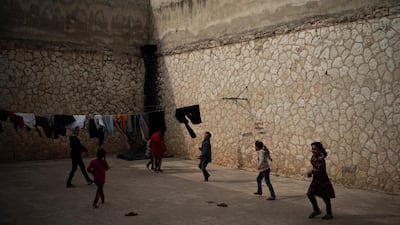Syrian President Bashar Al Assad issued an amnesty for prisoners on Sunday as fears rose that the coronavirus has been spreading on a scale far bigger than regime assertions of its containment .
Human rights lawyers said the decree would probably lead to the release of criminals in areas under Mr Al Assad’s control, leaving thousands of political prisoners at risk from the virus inside crowded jails.
The regime announced a case of the novel coronavirus on Sunday, after weeks of denying opposition reports that the disease was already spreading in prisons and the rest of the country.
Amnesty International had described conditions in Saidnaya, one of the main prisons for political prisoners and defectors from the military, as "sub human".
Health minister Nizar Yaziji said the authorities had recorded "a first case of the coronavirus in Syria in a person coming from abroad".
The amnesty decree covers a variety of offences that were committed before Sunday.
Syrian lawyers told The National that it mainly concerned murder, kidnapping and theft, and desertion from the army.
Anwar Al Bunni, a prominent Syrian human rights lawyer, said the decree did not cover 5,000 prisoners in regime jails, most of whom “had opposed the regime through non-violence”.
They and another 20,000 people in detention centres and secret police dungeons, are the few left of 95,000 civilians known to have been imprisoned or forced to disappear since March 2011, Mr Al Bunni said.
“The regime will eventually use the coronavirus to say that the outbreak killed them all,” he said from Berlin, where he lives in exile.
The only time a significant number of political prisoners were freed in Syria in the past decade was in mid-2011, under an amnesty that also freed militants the regime had encouraged to fight US forces in Iraq.
Many of them joined or formed Al Qaeda-linked groups after their release.
Another Syrian lawyer said several more amnesties since mid-2011 were applied randomly to exclude jailed dissidents.
“Do not expect much from a lawless regime,” the lawyer said. “Assad will probably release only a sample of political prisoners this time, if any.”
Unconfirmed reports by opposition activists say dozens of prisoners died over the past few weeks from coronavirus in Adra, a prison near Damascus that mainly holds those convicted of crimes.
Unlike the regime’s other notorious jails, where prisoners of conscience or captured rebels are incarcerated, outside visits by prisoners’ relatives are allowed in Adra, making it easier for information to flow out.
This week, the head of Damascus Municipality Health Department said the government had shown it was a model for fighting the pandemic.
“A lot of countries have adopted the way we have dealt with the coronavirus. Our plan is marvellous,” Hazar Raef told state TV.
But Hezbollah, the regime’s main militia backer, said this week it had been checking its fighters on their return from Syria to ensure they did not bring back the virus.
This month, Amnesty International raised the prospect of mass deaths from the virus in regime jails.
Kristyan Benedict, the organisation’s campaigns manager, said regime prisons were “already notorious for their inhumanity”.
He quoted former detainees in Saidnaya Prison, north of Damascus, who described 50 people jammed into a cell as small as three square metres.
“Detainees are already weakened by torture and other abuse, by neglect and fears for their future,” Mr Benedict wrote on Amnesty’s website.
“An outbreak of coronavirus would be a complete disaster.”


